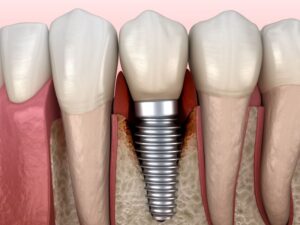
Dental implant failure is quite rare, but sadly, it does happen to some people. While you do not need to be overly worried that you will be a victim of this problem, you should be able to recognize its signs and symptoms so you can receive timely treatment should the need arise. In this blog post, you will learn what to look out for and how you can reduce your risk of dental implant failure.
Signs and Symptoms of a Failed Dental Implant
You might be experiencing dental implant failure if:
- You are in pain. Some soreness is to be expected in the days and weeks after dental implant surgery. Following that period, though, your implants should feel comfortable in your mouth. Unusual or severe pain deserves professional attention.
- There are signs of an infection. Pus, redness, swelling, and gum recession around a dental implant could all point to a dangerous infection.
- It is difficult for you to eat. Once you get used to your implants, you should be able to eat virtually any food without difficulty. Challenges in this area may indicate a significant problem.
- An implant feels loose. A loose-feeling implant might be a problem with your restoration (the crown, bridge, or denture on top of the implant) or the implant itself.
Dental implant failure can occur at any time, so you should always monitor your oral health and seek treatment right away if anything is amiss. The sooner you receive care, the more likely it is that your dentist can address the problem without extensive or invasive procedures.
Preventing Dental Implant Failure
While some cases of dental implant failure are beyond the patient’s control to prevent, many instances of failure are avoidable. Here are some tips to reduce your risk:
- Stick to a good oral hygiene routine. Thorough brushing and flossing can reduce the number of harmful bacteria in your mouth and help to keep infections at bay.
- Manage your overall health. A balanced diet, regular exercise, and other basic steps can support your immune system, reduce your risk of infections, and protect your dental implants.
- Attend regular dental checkups. If your dentist identifies any potential problems with your implants, they may be able to provide treatment before the issue becomes severe.
- Do not smoke. Smoking is a major risk factor for dental implant failure because it can cause dry mouth, slow down your ability to heal, and lead to other complications.
You do not need to live in fear of dental implant failure, but you should know how to recognize its signs! Use the information in this article to protect your precious smile!
Meet the Practice
Our Northborough dental team is proud to provide comprehensive dental implant services, including placement, restoration, and salvage for failing implants. If you have questions about this form of tooth replacement and how to make a success out of it, we would be pleased to speak with you. Get in touch with our office at 508-571-0358.
